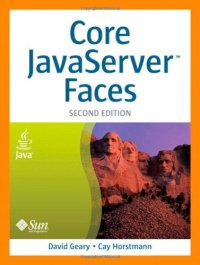
Ebook: Core JavaServer(TM) Faces
Author: David Geary Cay S. Horstmann
- Genre: Computers // System Administration
- Year: 2007
- Publisher: Prentice Hall PTR
- Edition: 2
- Language: English
- pdf
JavaServer Faces (JSF) is quickly emerging as the leading solution for rapid user interface development in Java-based server-side applications. Now, Core JavaServer™ Faces–the #1 guide to JSF–has been thoroughly updated in this second edition, covering the latest feature enhancements, the powerful Ajax development techniques, and open source innovations that make JSF even more valuable.
Authors David Geary and Cay Horstmann delve into all facets of JSF 1.2 development, offering systematic best practices for building robust applications, minimizing handcoding, and maximizing productivity. Drawing on unsurpassed insider knowledge of the Java platform, they present solutions, hints, tips, and “how-tos” for writing superior JSF 1.2 production code, even if you’re new to JSF, JavaServer Pages™, or servlets.
The second edition’s extensive new coverage includes: JSF 1.2’s improved alignment with the broader Java EE 5 platform; enhancements to the JSF APIs; controlling Web flow with Shale; and using Facelets to replace JSP with XHTML markup. The authors also introduce Ajax development with JSF–from real-time validation and Direct Web Remoting to wrapping Ajax in JSF components and using the popular Ajax4jsf framework.
This book will help you
Automate low-level details and eliminate unnecessary complexity in server-side development
Discover JSF best practices, ranging from effective UI design and style sheets to internationalization
Use JSF with Tiles to build consistent, reusable user interfaces
Leverage external services such as databases, LDAP directories, authentication/authorization, and Web services
Use JBoss Seam to greatly simplify development of database-backed applications
Implement custom components, converters, and validators
Master the JSF 1.2 tag libararies, and extend JSF with additional tag libraries
Preface
Acknowledgments
Chapter 1: Getting Started
Chapter 2: Managed Beans
Chapter 3: Navigation
Chapter 4: Standard JSF Tags
Chapter 5: Data Tables
Chapter 6: Conversion and Validation
Chapter 7: Event Handling
Chapter 8: Subviews and Tiles
Chapter 9: Custom Components, Converters, and Validators
Chapter 10: External Services
Chapter 11: Ajax
Chapter 12: Open Source
Chapter 13: How Do I . . .
Index
Authors David Geary and Cay Horstmann delve into all facets of JSF 1.2 development, offering systematic best practices for building robust applications, minimizing handcoding, and maximizing productivity. Drawing on unsurpassed insider knowledge of the Java platform, they present solutions, hints, tips, and “how-tos” for writing superior JSF 1.2 production code, even if you’re new to JSF, JavaServer Pages™, or servlets.
The second edition’s extensive new coverage includes: JSF 1.2’s improved alignment with the broader Java EE 5 platform; enhancements to the JSF APIs; controlling Web flow with Shale; and using Facelets to replace JSP with XHTML markup. The authors also introduce Ajax development with JSF–from real-time validation and Direct Web Remoting to wrapping Ajax in JSF components and using the popular Ajax4jsf framework.
This book will help you
Automate low-level details and eliminate unnecessary complexity in server-side development
Discover JSF best practices, ranging from effective UI design and style sheets to internationalization
Use JSF with Tiles to build consistent, reusable user interfaces
Leverage external services such as databases, LDAP directories, authentication/authorization, and Web services
Use JBoss Seam to greatly simplify development of database-backed applications
Implement custom components, converters, and validators
Master the JSF 1.2 tag libararies, and extend JSF with additional tag libraries
Preface
Acknowledgments
Chapter 1: Getting Started
Chapter 2: Managed Beans
Chapter 3: Navigation
Chapter 4: Standard JSF Tags
Chapter 5: Data Tables
Chapter 6: Conversion and Validation
Chapter 7: Event Handling
Chapter 8: Subviews and Tiles
Chapter 9: Custom Components, Converters, and Validators
Chapter 10: External Services
Chapter 11: Ajax
Chapter 12: Open Source
Chapter 13: How Do I . . .
Index
Download the book Core JavaServer(TM) Faces for free or read online
Continue reading on any device:

Last viewed books
Related books
{related-news}
Comments (0)